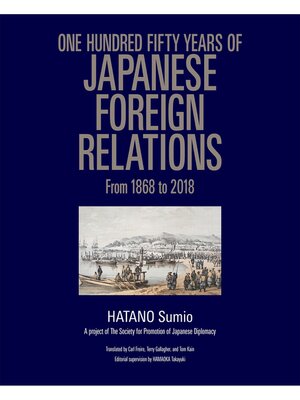
Sign up to save your library
With an OverDrive account, you can save your favorite libraries for at-a-glance information about availability. Find out more about OverDrive accounts.
Find this title in Libby, the library reading app by OverDrive.



Search for a digital library with this title
Title found at these libraries:
| Library Name | Distance |
|---|---|
| Loading... |
※この商品はタブレットなど大きいディスプレイを備えた端末で読むことに適しています。また、文字だけを拡大することや、文字列のハイライト、検索、辞書の参照、引用などの機能が使用できません。
This book traces the past 150 years of Japan's diplomatic history, focusing on the thoughts and actions of the leaders of the Ministry of Foreign Affairs since the ministry's establishment in 1869. It includes a discussion of the last fifteen years of the Edo period, beginning with the arrival of Commodore Perry in 1854. Since the Meiji era, Japan's foreign policy has been informed by its response to that "confrontation from the West."
This foreign policy has been largely based on "accommodation diplomacy" (also called responsive diplomacy). Japan has designed its diplomatic response with an eye to its own foreign policy goals, applying the metric of what might be feasible more than what might be desirable. In "accommodation diplomacy," the international issues, international order, and the rules of the game are not defined. In that sense, there has been no all-encompassing strategy behind Japan's foreign policy. Instead, Japan has regarded the international situation simply, as a set of facts. It has sought to maximize the benefits to itself while minimizing risk. Its foreign policy has been an attempt to solve this conundrum through accommodation. Reflective of the times, this has required an abundance of creativity. Japan has needed to be both pragmatic and forward-thinking in its response to changes in the international environment.
In the postwar period, as Japan aimed to elevate its standing in the competition-driven international environment, its foreign policy can be understood as an extension of the way it had comported itself since the Meiji era: emphasizing cooperation and coordination with other nations while responding to changes in the international environment.
This book traces the past 150 years of Japan's diplomatic history, focusing on the thoughts and actions of the leaders of the Ministry of Foreign Affairs since the ministry's establishment in 1869. It includes a discussion of the last fifteen years of the Edo period, beginning with the arrival of Commodore Perry in 1854. Since the Meiji era, Japan's foreign policy has been informed by its response to that "confrontation from the West."
This foreign policy has been largely based on "accommodation diplomacy" (also called responsive diplomacy). Japan has designed its diplomatic response with an eye to its own foreign policy goals, applying the metric of what might be feasible more than what might be desirable. In "accommodation diplomacy," the international issues, international order, and the rules of the game are not defined. In that sense, there has been no all-encompassing strategy behind Japan's foreign policy. Instead, Japan has regarded the international situation simply, as a set of facts. It has sought to maximize the benefits to itself while minimizing risk. Its foreign policy has been an attempt to solve this conundrum through accommodation. Reflective of the times, this has required an abundance of creativity. Japan has needed to be both pragmatic and forward-thinking in its response to changes in the international environment.
In the postwar period, as Japan aimed to elevate its standing in the competition-driven international environment, its foreign policy can be understood as an extension of the way it had comported itself since the Meiji era: emphasizing cooperation and coordination with other nations while responding to changes in the international environment.







